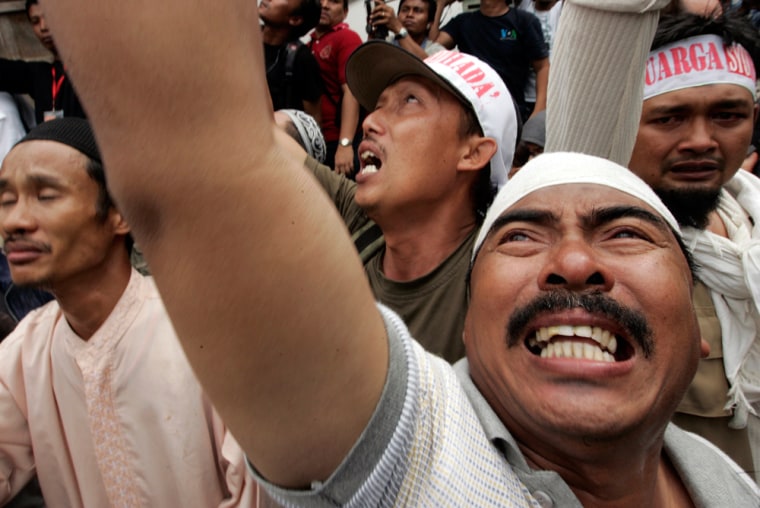Indonesia executed three Islamic militants by firing squad for the 2002 Bali bombings that left 202 people dead, many of them foreign tourists, authorities said Sunday as they braced for possible revenge attacks by hard-liners.
The bodies of Imam Samudra, 38, and brothers Amrozi Nurhasyim, 47, and Ali Ghufron, 48, were brought by helicopter from the prison island of Nusakambangan to their villages in east and west Java, ending years of uncertainty about their fate.
The executions, sensitive for both political and security reasons, had been postponed many times, frustrating survivors and relatives of victims, and enabling the bombers to rally supporters from behind bars.
Men called martyrs
Thousands turned out in the towns of Tenggulun and Serang early Sunday to welcome home their bodies. Some radicals lined the streets, chanting "God is great!" and calling the men martyrs. Others scuffled briefly with police, but there were no serious disturbances.
The Oct. 12, 2002, attacks — allegedly funded by al-Qaida and carried out by members of the Southeast Asian militant group Jemaah Islamiyah — were the first of several suicide bombings that thrust the world's most populous Muslim nation onto the front lines in the war on terror.
The three never expressed remorse, saying the bombings were meant to punish the U.S. and its Western allies for alleged atrocities in Afghanistan and elsewhere. They even taunted relatives of victims — 88 of whom were Australian — at their trials five years ago and regularly gloated to reporters.
In recent months, the men had publicly expressed hope their executions would trigger revenge attacks in Indonesia, a nation of 235 million, where support for the bombers is limited to a minority.
On high alert
Security forces were placed on high alert ahead of the midnight executions. Extra police were deployed in their hometowns and at embassies, shopping malls and offices in the capital, Jakarta.
"Everyone should be extra vigilant," said Ken Conboy, a Jakarta-based security expert, anticipating demonstrations and bomb hoaxes rather than fresh attacks. But, he noted, even peaceful rallies "can quickly spin out of control."
The U.S. and Australian embassies, which received bomb threats in recent days, were among those warning their citizens to be careful.
Though the three Bali bombers said they were happy to die martyrs, their lawyers fought for years to stop their executions, arguing they were convicted retroactively on anti-terrorism laws.
They also opposed death by firing squad, saying their clients preferred beheadings because they were more "humane."
Mixed emotions
It was a day of mixed emotions for survivors and relatives of victims in Australia.
Brian Deegan of Adelaide, who lost his son Josh in the bombings, said "the tears don't roll quite as often, that absolute gut-ache has diminished a bit," but that nothing will ever make the pain disappear.
He staunchly opposes capital punishment and worries about revenge attacks, even though Jemaah Islamiyah has been severely weakened by hundreds of arrests, with its last attack occurring more than three years ago.
"There's no shortage around the world of persons that are prepared to commit suicide to achieve a result," Deegan said.
Others expressed relief that justice had been served at last.
"These guys went to set about mass murder and paid the highest penalty," said Peter Hughes of Perth, who suffered horrific burns in the bombings. "It doesn't feel good, but they did do the crime and they've paid for it."
Both men spoke in Australia.
Though Indonesia's government is eager to show it is tough on terrorists, it worried that the executions would trigger a security backlash. And, with general elections less than six months away, they were considered politically sensitive: President Susilo Bambang Yudhoyono risks losing the votes of conservative Muslims.
The three men were among more than 30 people convicted in connection with the twin nightclub blasts.
Jemaah Islamiyah was blamed for at least three other suicide bombings in Indonesia. But the 2002 attack was by far the bloodiest.
One of the attackers walked into Paddy's nightclub on a busy Saturday night, setting off a bomb attached to his vest. Minutes later, a larger car bomb exploded outside the nearby Sari Club.
The dead included 38 Indonesians, 28 Britons and eight Americans — most revelers fleeing the first blast.
Dozens of victims and tourists gathered at "ground zero" of the bombings Sunday to pray and pay their respects to the dead.
